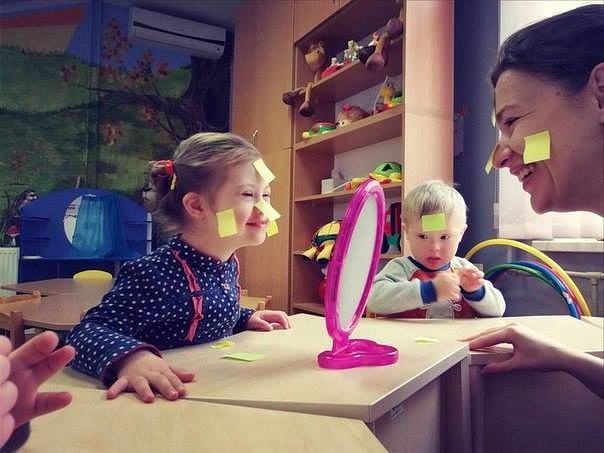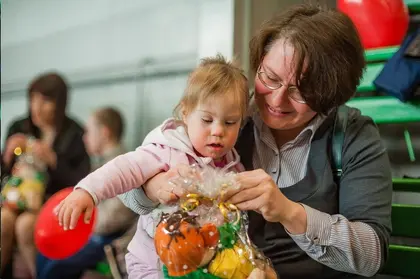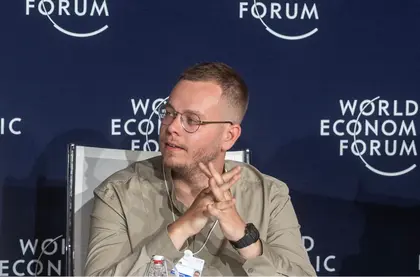Like any other two-year-old, Sophia loves to play with other children. She loves her toys and is always ready to give people a big hug – even strangers.
But she has to work twice as hard just to keep up with other kids, because she has Down
syndrome, a genetic disorder that slows her physical and intellectual
development.
She attends an early development group for children with Down syndrome once a month, a
regular nursery school twice a week, and has private classes with a
developmental specialist once every two weeks.

Sophia’s mother, Iryna Basova, told the Kyiv Post that children with Down syndrome have
to spend more time learning to develop their sense and motor skills than their
peers.
“Even a little progress is a huge success,” she said.
Down syndrome is caused by the presence in a person’s genome of 47 chromosomes instead of the usual 46 – they have a full or partial copy of chromosome 21. People with Down syndrome suffer from physical growth delays, flattened facial features, and
mild to moderate intellectual disability. There are around 8, 000 children with Down syndrome in Ukraine, according to the charity organization Down Syndrome.
Many children with Down syndrome suffer from additional health issues such as heart disease, poor hearing and cataracts. All have speech problems.
“A baby
with a Down syndrome is a big school of life for the parents. But you get lots
of surprises, joy and love,” Basova said.
Basova said
that doctors in maternity hospitals in Ukraine often fail to provide parents of
children with Down syndrome with the information they need to properly care for
their child. Worse still, many maternity hospital workers try to persuade
parents to give up their child to state care when the child is diagnosed with
the disorder. The syndrome occurs in one
in every 1,000 births.
Sergiy
Kuryanov, the head of the Down Syndrome charity, says his organization polled
medical workers in 2015 on whether they advise their close relatives to abandon the
child with the syndrome, or to abort the fetus if possible. The answers were
split according to the age of the respondents: 87 percent of people under 45
said that they would keep the child, or were unable to answer the question. But
96 percent of respondents over 45 said they would advise to make an abortion or give a child
with a Down syndrome into state care.
“The poll
shows that there are prejudices among medical workers,” Kuryanov said.
He said
Ukrainian society still views people with Down syndrome as incapable of taking
care of themselves, and that they are mentally odd and unstable. His
organization is trying to change these misconceptions.

A girl awards a soccer player at the charity soccer match organized by public organization Down Syndrome on April 23. (Vitaly BiletskyUkrainian charity organization Down Syndrome)
Down
Syndrome is the biggest charity organization in Ukraine that helps children
born with Down syndrome. It provides parents with the information and legal
assistance. The charity doesn’t get any support from government, being funded
solely by donations from private companies and individuals. Established in
2003, the charity has raised around $375,000 to fund education and development
programs.
Since 2010,
the charity has supported the Center for Early Development, where therapists
work with babies under three years old. The center also has groups that
conduct special training sessions with children from five to eight years old
once a week, and provides children with the individual services of
psychologists, teachers and speech therapists.
Tatyana
Yaremchuk, the mother of Maria, a 5-year-old child with Down syndrome, says the
life of her family is divided into “before the center and after.” Originally
from Makyivka in Donetsk Oblast, they moved to Kyiv after war erupted in the
Donbas. There were no centers in Makyivka for children with Down syndrome,
Yaremchuk told the Kyiv Post.
After
completing courses in the center, many children go on to attend specialized
kindergartens or inclusive classes in local schools. However, not all schools agree to enroll
children with Down syndrome, despite Ukrainian law stipulating that all
citizens, including children with Down syndrome, are entitled to an
education.
Sergiy
Gorodv was rejected several times when looking for a kindergarten for his son
Bogdan, who has the disorder. Bogdan now attends an inclusive group in a
specialized kindergarten, and his father can see his son making progress.

Children play during their classes in the Early Development group for children with Down syndrome. (Ukrainian charity organization Down Syndrome)
“We went to
a speech therapist before kindergarten, but he (Bogdan) learns how to talk more
quickly when he’s with other children,” Gordov said. “He only used to produce
some noises, but now speaks in sentences, although not very intelligibly.”
According
to Ukraine’s Education Ministry, a total of 17,790 children with mental
disabilities, including children with Down syndrome, study at special boarding
schools, while only 554 attend inclusive classes in regular local schools. Kyiv
has 22 kindergartens where children with Down syndrome study in separate or
inclusive groups, according to the charity Down Syndrome.
But the
lack of inclusive classes is not the only problem – the state education program
itself doesn’t cater to the needs of children with Down syndrome.
People with
Down syndrome are highly visually oriented — they need lots of pictures and
step-by-step instruction in their studies. But Kuryanov, the head of charity Down
Syndrome, also said that people with the disorder are very good at doing
routine manual work that involves a lot of repetitive actions.
“What
amazes me in people with the syndrome is that they can do the same stuff day
after day, and don’t get bored or stressed. They’re just happy with it being
that way,” he said.
Kuryanov
said that the state education program doesn’t give children with Down syndrome
the practical knowledge they need to get a job after school. They have to be
taught practical skills, like counting money rather than doing arithmetical
problems, and drawing up shopping lists instead of solving math equations.
Teachers
who work with Down syndrome children also need training so the children can get
the best out their education, Kuryanov said.
While most
pedagogical universities have courses on developmental pedagogy or therapy,
most provide future teachers and therapists with only a superficial theoretical
knowledge of working with children with Down syndrome, and no practical experience.
As a result, most new teachers are ill-prepared to work with children who have
special needs.
And it’s
not just children with Down syndrome who would benefit from an overhaul of
teacher training, Kuryanov said.
“All
children would benefit if the system of education switched from providing
academic knowledge, to practical training,” he said.
You can also highlight the text and press Ctrl + Enter







Comments (0)